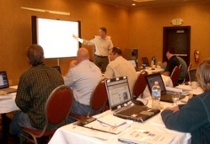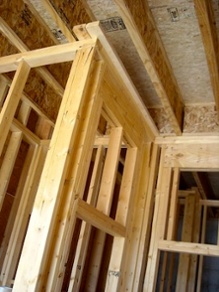The Value of Training in Building Science – Another Perspective

Guest Post by Sean Lintow, who has been in three classes I taught (HERS, ENERGY STAR Version 3, and Advanced HVAC for Raters) and uses Energy Vanguard Energy Ratings as his HERS provider.
Guest Post by Sean Lintow, who has been in three classes I taught (HERS, ENERGY STAR Version 3, and Advanced HVAC for Raters) and uses Energy Vanguard Energy Ratings as his HERS provider.
~~~~~~~~~~~~~~~
Training – The How, the What, & Why
Your mission should you choose to accept it… Nah, that was not how the message went asking me if I would consider writing a guest post, but it soon started to feel that way after I said sure. The topic of choice “How about writing on your reasons for getting all this training, what you plan to do with it, & how it’s helped so far.” Now as one that has written over 20 articles ranging from the value of continuing education for those of us in the construction field, to my classes for RESNET, BPI, CEA and others, one might not think that this would be to difficult, well (5 busy weeks later)…
Why all the training?
Before embarking on my whirlwind tour of certifications, I have always been a proponent of continuing one’s education. My main goal, shoot my only goal / resolution in life and business is to improve in at least one area, and to learn at least one new item a day. While some may find this curious, I have always loved this quote “If you stop learning, you stop creating history and become history.” I think Amy Good also summed it up pretty well last week, when she simply said she was looking forward to downloading a webinar (that she easily could have taught), so she might learn a few new tricks.
I have been following the high performance and alternative building practices for a few years (ok, it has been decades) and have been encouraged to see how far it has come, mistakes were learned from & corrected, and seeing many of the original practices getting validated and becoming main stream. While the markets were humming along nicely and work kept flowing in, there simply wasn’t enough time to do more than just simply try to keep up, but with the downturn, along came a nice opportunity.
original practices getting validated and becoming main stream. While the markets were humming along nicely and work kept flowing in, there simply wasn’t enough time to do more than just simply try to keep up, but with the downturn, along came a nice opportunity.
What are your plans?
But wait, you never answered why the whirlwind of training and certifications – well, that actually dovetails nicely into what our plans are. You see if you do not know where you want to go, or what you hope to accomplish, how will you ever get there? For me, I saw a silver lining in the downturn to add in some new complementary services, but also ones that would enable us to move completely into that arena over the next few years. As I love to joke with others – hey, one’s back & knees can only survive so much and there is a reason that Alabama is tied for 48th place in this arena.
How has it helped so far?
Financially, I have had a few months were I almost was in the black based solely on this, which is pretty standard across the board, for those that do auditing and consulting only work at this time. Fortunately, my livelihood does not solely depend on this, so it has not been an issue. The one major area where it has helped is fine-tuning and creating a more analytical view of the building practices, how one change affects another via modeling, etc. I would also say that by going through this entire process, the biggest benefit is not only meeting others, but also tapping into a network where the goal is always, How can we do things better?
Final thoughts, advice?
I generally am asked one of two questions as it relates to this pursuit, and that is, What would I different, and the other one falls along the lines of, Do you have any advice for those considering entering into this field? In answer to the first question, I would have skipped the time and money spent on the BPI training and certifications, as they are essentially worthless unless you happen to live in a state or area where they have managed to finagle their way into a program you are interested in.
As for the second portion, I truly recommend that you consider what your strengths, weaknesses, and desires really are and figure out which way you want to go. Do you simply want to rate new homes, older homes, work on them, increase your knowledge of building science, find ways to do your job better, or… If you have never worked in the trades or fields, I highly recommend you skip any certification programs until you actually get your hands dirty and have a base of knowledge & experience to work from.
For some great sources of information to help you learn more (besides my blog, of course), I highly recommend the Energy Vanguard Blog, Martin’s Energy Musings, the great guys at Building Science Corporation.
As Allison said in his last Advanced HVAC class I took, one can never stop learning.
Sean Lintow runs SLS Construction in Cullman, Alabama, where he does remodeling, restoration, and home repairs. In addition, he owns Alabama Green Building Services, through which he offers the building science services that he’s been so thoroughly trained for. He’s also an all-around great guy who writes a blog and is active on Twitter (@SLSConstruction).
This Post Has 8 Comments
Comments are closed.

Nice article. As long as I
Nice article. As long as I have been in the construction industry, I have been very interested in the energy aspect building. However as a woodworker I was rarily actually involved in it. So as a reaction to the downturn and fears of what it might mean for my timber framing business, I decided to become a HERS rater, “just in case”. Now almost 2 years after taking my class, I have not done my first paid rating.
If I never do a rating, all my time and effort have been well spent. Our business has picked back up, so Ive been to busy to pursue the rating work. Not a day goes by that I don’t use something I learned and I believe the houses we build are better for it.
Stephen, thanks for posting
Stephen, thanks for posting about your experience here. Your last sentence says it all:
“Not a day goes by that I don’t use something I learned and I believe the houses we build are better for it.”
Sean — thanks for taking the
Sean — thanks for taking the time to share your story; down with learning you know. Also love the serendipitous elements how your recent wave of training came to be . . . love that you saw the positive in things. if nothing you have become way more marketable. continued success with your biz, learning …every day. ~jb
Allison thanks again for
Allison thanks again for opportunity for the posting.
JB, as always thanks for the support & great comments
Stephen, AMEN & I definitely agree your last line sums it up quite nicely.
I hope you all had a great week & here’s to an even better weekend
Great post… I’ve been
Great post… I’ve been thinking about a few extra classes, and this just gave me another little nudge.
Sean — As some one who
Sean — As some one who places great personal emphasis on doing things well, while also expanding your own knowledge base, you have two other great qualities: both your ability, and your desire, to teach these things to others. That’s something the rest of us (myself especially) have greatly benefitted from. So thanks for all your continued writings and communications, Sean. It’s highly valued, and very much appreciated.
Sean, Enjoyed the post as
Sean, Enjoyed the post as well! And Stephen…it sounds like you and I are walking in similar shoes. Two years later and still not a paid rating, but 24 years in building industry and I know that my building knowlege has benefitted immensely. I’ll continue to seek out building science learning opportunities.
This has got to be the most
This has got to be the most exciting time to be in the construction industry. Between the emerging field of building science, modern engineering, computer design and modeling, and the years of construction experience behind us, if we pay attention to educational opportunities, we are in a position to be building the best buildings possible.